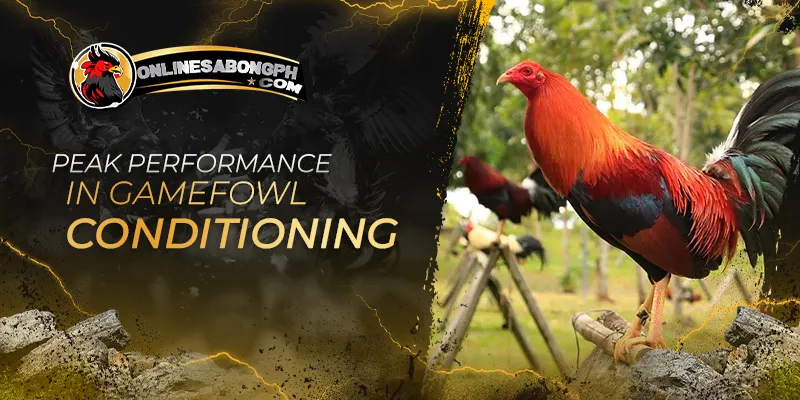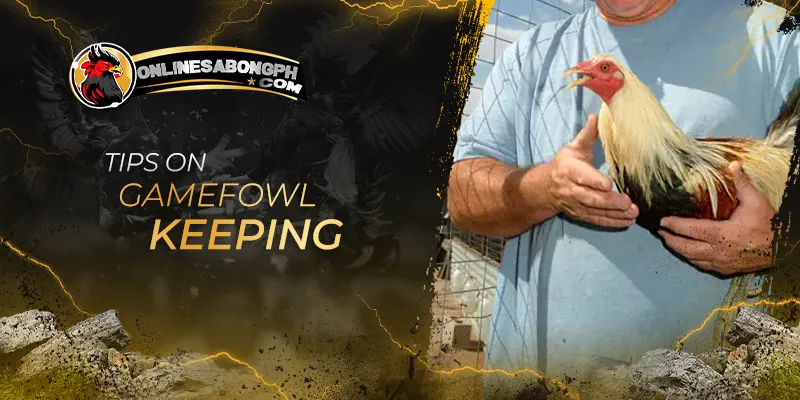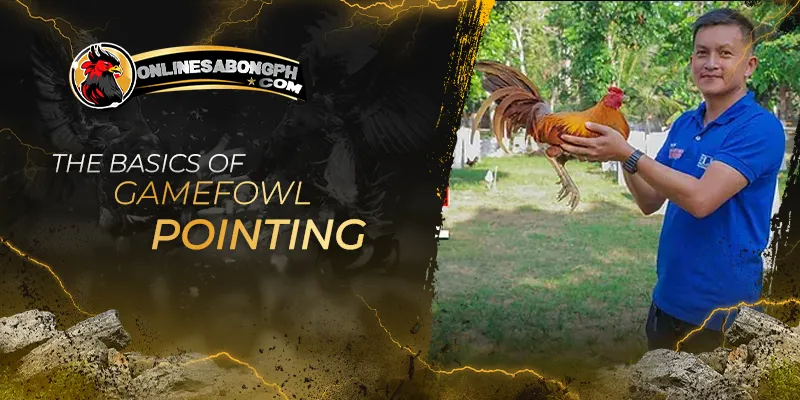Want your gamefowl to be the best? This guide of Online Sabong PH is your key! Learn everything you need about feeding, housing, health, breeding, and the secret ‘pointing’ technique for top performance. Whether you aim for the ring, the show, or just a strong, healthy bird, this is your resource.

About Gamefowl Keeping
Gamefowl keeping is a unique practice with a long history. Unlike regular chickens, gamefowl have powerful bodies and a natural fighting instinct. They come in many different breeds and have been important in cultures around the world. Raising gamefowl requires special knowledge about breeding, feeding, exercise, and keeping them healthy. The goal is to have strong, healthy birds, whether for competition, showing, or even as unusual pets.

Getting Started with Gamefowl Keeping
Responsible gamefowl keeping starts with understanding their unique housing and environmental needs. Before bringing these birds home, it’s crucial to create a space that ensures their safety, health, and overall well-being.
Individual Housing
Individual housing means keeping each gamefowl in its own separate enclosure. This could be a small coop or a compartment within a larger structure.
The Standard for Good Reason:
Individual housing is generally considered the safest and most humane practice for gamefowl, especially for males.
Reasons for Individual Housing:
- Aggression Prevention: Even with careful socialization, gamefowl retain strong fighting instincts. Separate housing eliminates fighting risk and minimizes injuries.
- Breeding Control: Individual housing allows for targeted breeding programs and keeps track of bloodlines.
- Health Monitoring: It is easier to spot health issues or changes in individual birds when housed separately.
Considerations:
- Space: Requires more overall space than flock housing.
- Enrichment: Each bird needs a stimulating environment to prevent boredom and behavioral problems.
Flock Housing
Flock housing involves keeping multiple gamefowl together in a single enclosure or run. This could be a larger coop or aviary-style setup.
Limited Applications
Flock housing is generally not recommended for gamefowl, but there are a few specific situations where it might be considered:
- Young Pullets: Females, before they reach full maturity, may tolerate each other if raised together but require careful supervision as they age.
- Trio Breeding: In some cases, keeping one rooster with two or three hens in a dedicated breeding setup may be feasible for short periods.
Challenges of Flock Housing:
- Aggression and Injuries: Even within a hen flock, gamefowl have a natural pecking order that can lead to fighting and injuries. Roosters housed together almost always fight to the death.
- Close Monitoring: Flock housing requires extremely vigilant supervision to intervene quickly at the first signs of serious aggression.
- Breeding Control: It’s difficult to identify parentage and maintain bloodlines in a flock setting.
- Disease Spread: Illness can spread rapidly in a flock, making early detection and treatment harder.
Important Note:
Even though flocking might seem like a space-saving option, the risks often outweigh the benefits when it comes to gamefowl. Individual housing prioritizes their safety and well-being.
Climate and Temperature
Climate and temperature play a significant role in the health and well-being of gamefowl. While these birds are relatively adaptable, both extreme heat and cold can cause problems.
Cold Weather Considerations
- Insulation: Provide well-insulated coops in colder climates.
- Draft Protection: Prevent drafts that can lead to chills and respiratory issues.
- Supplemental Heat: Consider safe heating options during extreme cold snaps.
Hot Weather Considerations
- Ample Shade: Offer shaded areas both within coops and in outdoor runs.
- Ventilation: Ensure good airflow to prevent heat stress.
- Fresh Water: Provide multiple sources of clean, cool water to prevent dehydration.
Humidity
Ventilation is Key: Proper ventilation in coops is essential regardless of climate, but it has become even more important in humid areas.
- Prevents mold and respiratory problems: Trapped moisture creates ideal conditions for health issues.
- Moderate Humidity Is Ideal: Gamefowl thrives in moderate humidity levels. Excessively dry conditions can also cause issues.
Lighting
- Natural Light: Maximize natural light exposure in coops
- Health Benefits: Sunlight supports a healthy immune system and vitamin D production.
- Supplemental Lighting (for breeding): To stimulate egg-laying in hens, you may need to extend daylight hours during the breeding season with artificial lighting.
Biosecurity
Good biosecurity practices are essential to protect your flock:
- Limit Visitors: Restrict access to your gamefowl area to prevent diseases from being introduced from outside.
- Footbaths: Consider foot baths with disinfectant at the entrance to your bird area.
- Quarantine New Birds: Isolate new arrivals for several weeks before integrating them with your flock.
Important Note:
Always observe your birds closely. Their behavior and appearance are often the best indicators of whether their environment is meeting their needs.
Before You Get Started
Before diving into gamefowl ownership, take the time to learn from the right sources. Seek out experienced breeders for mentorship and consult reputable resources on gamefowl care. This will help you make informed decisions and practice responsible ownership.
Seek Mentorship
Finding a knowledgeable and experienced gamefowl breeder who prioritizes responsible practices is invaluable.
Breed selection suitable for your goals:
- Housing and care best practices.
- Health management and identifying potential issues.
- Responsible breeding and selection (if applicable).
Reliable Resources
Expand your knowledge with reputable sources.
- Breed-Specific Websites and Forums: Online communities dedicated to specific gamefowl breeds provide insights into breed characteristics and care.
- University Extension Websites: Often offer livestock management guides, including information on biosecurity and disease prevention.
- Veterinarians Specializing in Poultry: Identify a vet in advance who can provide care for your gamefowl.
Important Considerations:
- Safety & Handling: Gamefowl, especially roosters, can be aggressive even with proper socialization. Take these precautions:
- Learn Handling Techniques: Seek guidance from a mentor on how to handle and restrain gamefowl safely.
- Supervise Interactions: Always supervise children around gamefowl.
- Immediate Separation: If birds show aggression, house them individually to prevent serious injury or death.
Remember:
Choosing a reputable mentor and reliable sources ensures you start your gamefowl journey with a strong foundation of knowledge and ethical practices.
Selecting Your Gamefowl
Understanding the unique qualities of different breeds is crucial for making the right choices.
Fighting Styles
Gamefowl breeds exhibit distinct fighting styles and techniques. Some examples:
- Power Fighters (Like Kelsos, Butchers) – Deliver heavy blows, relying on strength and aggression
- Shufflers/Speed Fighters (Sweaters, Greys) – Utilize quick footwork, evasion techniques, and rapid strikes.
- High Station/Upright Fighters (Certain Roundheads, Orientals) – Favor an upright stance, targeting the head and neck of their opponents.
- Temperament: Some breeds are more docile and easier to handle, while others can be highly aggressive. Consider your experience level and management capabilities.
Physical Attributes
- Size/Weight: Choose birds appropriate for your intended use (breeding, fighting, show, meat)
- Color: Some breeds have distinctive colors and patterns.
- Comb Type: Comb types (pea comb, straight comb, etc.) can be breed-specific.
- Climate Tolerance: Select breeds well-suited to your region’s climate.
Reputable Breeders
Prioritize breeders focused on health, breed standards, and ethical practices. They demonstrate:
- Knowledge of Bloodlines: Can discuss a bird’s lineage and expected traits.
- Selective Breeding: Focus on improving breed qualities over generations.
- Humane Care: Maintain clean, spacious facilities.
Auctions
They can offer a range of birds, but exercise caution. Evaluate health and temperament carefully.
- The Livestock Conservancy (https://livestockconservancy.org/) Provides information on breeds and helps locate breeders focused on heritage lines.
- Breed-Specific Clubs/Associations: Connect with other enthusiasts for advice and referrals.
- Online Forums: Seek recommendations, but be aware of potential misinformation.
Important Considerations:
- Start Small: If you’re a beginner, start with a few birds to learn proper care.
- Health Check: Visually inspect birds for signs of illness or injury.
- Quarantine: Isolate new arrivals for a few weeks to prevent disease from spreading.
Housing and Environment for Gamefowl
Crafting an optimal living environment is crucial for the health and well-being of your gamefowl.:
Predator-Proof
Your coop is your birds’ fortress:
- Strong Materials: Use sturdy wood and hardware cloth (wire mesh with small openings). Avoid materials easily chewed or broken.
- Secure Floor: Concrete or raised floors covered with appropriate bedding deter predators from digging in.
- Solid Latches: Prevent accidental openings and deter determined predators like raccoons.
Space Requirements
Avoid overcrowding, a source of stress and disease:
- Roosts: Provide enough roosting space for all birds (approximately 1 foot per bird).
- Nest Boxes: If breeding, include sufficient nest boxes (approx. 1 per 3-4 hens).
- Floor Space: Allow ample space for exercise within the coop during confinement.
Spacious Area
Provide as much space as possible for:
- Exercise: Promote muscle development and natural behaviors.
- Foraging: Encourage natural feeding and supplement their diet.
- Dust-bathing: Areas with loose soil or sand help maintain feather health and control parasites.
Security
Use a combination of fencing, burying wire mesh, and overhead netting, if needed, to protect from predators.
Sanitation
- Food and Water: Clean feeders and water daily to prevent contamination.
- Bedding: Replace soiled bedding in the coop regularly (frequency depends on bird number and climate). Options include pine shavings, sand, or rice hulls.
- Droppings: Remove droppings from floors and roost frequently.
- Deep Cleaning: Periodically deep clean the coop, scrub surfaces, and disinfect after any illness outbreaks.
Additional Considerations
Cold Climates: These may require insulated coops or supplemental heat.
Hot Climates: Provide ample shade and ensure good ventilation.
Individual Pens: These might be necessary to condition birds, separate incompatible individuals, or during breeding.
The Basics of Gamefowl Pointing

Gamefowl pointing is a specialized process aimed at bringing out the best physical and mental condition in gamefowl, typically leading up to competitions. This involves a combination of nutrition, training, and health management to optimize performance.
Components
- Nutrition: A precise, high-performance diet to build strength and lean muscle.
- Training: Specialized exercises to refine fighting techniques and boost cardiovascular fitness.
- Mental Conditioning: Building confidence, focus, and aggression (within a specific controlled context).
- Health Management: Monitoring for any signs of illness, parasites, or injuries.
Preparing for Pointing
- Healthy Foundations: Birds must be in excellent health and free of any underlying issues before you start the rigorous pointing process.
- Pre-Pointing Nutrition: Ensure a balanced, high-quality maintenance diet to build a strong foundation.
- Gradual Conditioning: Gradually increase exercise intensity and duration to avoid injury and optimize stamina.
Pointing Techniques and Strategies
No Universal Approach: Pointing methods are highly individualized, with techniques passed down through generations of gamefowl breeders and trainers.
Key Considerations:
- Duration: Pointing usually lasts several weeks, depending on the individual bird’s response.
- Feed Adjustments: Gradual shifts in protein levels, carbohydrates, and supplements to achieve the desired body composition and energy levels.
- Sparring Short, controlled sparring sessions to refine technique and fighting instinct.
- “Keep” Area: A quiet, designated area for pointing reduces distractions and stress.
Important Notes:
- Observation is Key: Monitor birds closely for signs of stress, injury, or over-training. Adjust the process accordingly.
- Ethical Considerations: Ensure pointing is done humanely, and avoid pushing birds beyond their natural limits.
- Seek Experienced Mentorship: The nuances of pointing are best learned from experienced breeders or trainers.
Disclaimer:
The use of certain supplements or techniques within competitive gamefowl circles might be controversial or have legal considerations based on your location. Always prioritize the bird’s health and well-being, and operate within established ethical guidelines.
Health and Nutrition
A cornerstone of successful gamefowl keeping is a deep understanding of health and nutrition:
- Chicks/Growers: Require higher protein for development.
- Maintenance: Balanced diet for healthy adults.
- Pre-Conditioning: Gradual increase in protein and energy-rich feeds in preparation for pointing.
- Pointing: Specialized, high-performance diet for peak condition.
Invest in gamefowl-specific and quality feeds. These provide the right balance of:
- Protein: Crucial for muscle building and repair (approx. 18-22%, depending on the stage).
- Carbohydrates: Energy source for training and performance.
- Vitamins and Minerals: Support overall health, immune function, and feather development.
Consider additional supplements under guidance
- Vitamins B Complex: Boost energy and metabolism.
- Electrolytes: Prevent dehydration during the warmer months or intense training.
- Probiotics: They may support gut health.
Feeding Schedule
- Typically, gamefowl are fed once or twice a day.
- Consistent schedules promote good digestion.
- Adjust amounts based on individual needs and activity levels.
Health Issues
- Cleanliness: Maintain and run a sanitary coop.
- Quality Feed and Water: Prevents nutritional deficiencies and contamination.
- Quarantine: Isolate new birds before integrating them with your flock.
Common Issues:
- Respiratory Diseases: Watch for discharge, coughing, sneezing
- External Parasites: Check for mites and lice in feathers and on the skin.
- Internal Parasites: Periodic deworming may be necessary.
- Fungal Infections: Can occur in humid climates.
Veterinary Care: Find a vet familiar with gamefowl, if possible, for emergencies and consultation.
Important Notes:
- Observe Your Birds: Learn their normal behavior to spot subtle changes that could indicate health problems.
- Research Thoroughly: Explore resources on common gamefowl diseases, symptoms, and treatments. However, seeking expert veterinary advice is always recommended.
- Responsible Use of Medications: Always use medications and supplements as directed and avoid overuse.
Breeding Gamefowl
Developing a successful gamefowl breeding program requires careful planning. Define the traits you want to enhance, such as fighting style, build, or coloration. Select birds for breeding by closely evaluating their traits and genetics to meet your goals. Breeding gamefowl is complex and requires patience, knowledge, and a long-term vision for success.
- Health: Only breed birds free of disease and defects.
- Conformation: Select birds adhering to breed standards.
- Performance Traits: For those interested in competitions, consider previous show or fight records and lineage.
- Temperament: Certain traits, like aggressiveness or broodiness, can be heritable.
Understanding Basic Genetics
- Genes Come in Pairs: Most organisms, including gamefowl, inherit one copy of each gene from each parent.
- Alleles: Different Versions: Each gene can have different versions called alleles. For example, a feather color gene may have alleles for black feathers, white feathers, etc.
Dominance and Recessiveness
- Dominant: A dominant allele masks the effect of other alleles for that same gene. If even one dominant allele is present, the dominant trait will be expressed. These are often represented by capital letters (e.g., “B”).
- Recessive: A recessive allele is only expressed if two copies are present (one from each parent). Recessive alleles are often represented by lowercase letters (e.g., “b”).
Let’s consider a simplified example with feather color in gamefowl:
- “B” allele = black feathers (dominant)
- “b” allele = white feathers (recessive)
Possible Combinations:
- BB (Homozygous Dominant): The bird has two dominant alleles, resulting in black feathers.
- Bb (Heterozygous): The bird has one dominant and one recessive allele, but will still have black feathers since the dominant “B” masks the recessive “b”.
- bb (Homozygous Recessive): The bird has two recessive alleles. As no dominant allele is present to mask the effect, the bird will have white feathers.
Breeding Season Management
- Timing: The typical breeding season varies by region but often starts in early spring.
- Conditioning: Ensure both hens and roosters are in optimal health and physical condition before breeding.
Housing
- Breeding Pens: May house one male with a few selected hens.
- Nesting Boxes: Provide comfortable, private nesting spots for hens.
- Egg Collection: Collect eggs daily, store them properly, and track fertility rates.
- Incubation & Hatching: Choose between natural brooding by hens or artificial incubation and hatching.
Record-Keeping
- Pedigree: Parentage and lineage of each bird.
- Performance Traits: Identify bloodlines producing desirable offspring.
Important Considerations:
- Space: Breeding requires additional pens and facilities to separate breeding stock, raise chicks, and house young birds.
- Commitment: Successful breeding is a long-term project requiring patience, observation, and dedication.
- Ethics: Always breed responsibly, avoiding overbreeding or perpetuating unhealthy bloodlines.
Conclusion
Gamefowl keeping and pointing are steeped in tradition and demand expertise. This guide offers a strong foundation for newcomers and those seeking to improve their skills. By prioritizing the birds’ well-being, staying committed to ethical practices, and constantly learning, you can experience the deep rewards of raising and training these remarkable birds.
